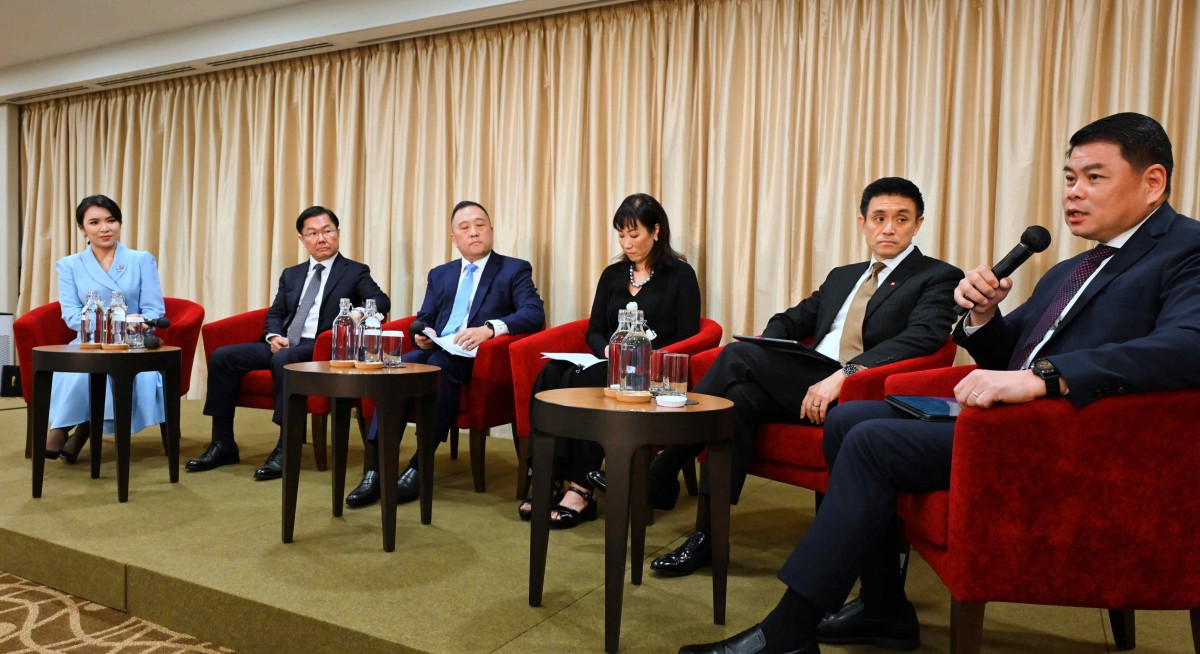See also: MAS pilot Project Orchid displays promise for further Web 3.0 development
See also: Asean FinTech sector resilient at US$4.3 bil for 2022: UOB, PwC and SFA report
 While Singapore’s financial sector has done well, the external environment has become more complex and challenging, says Wong. “We are only just recovering from the Covid-19 pandemic but we don’t get to take a breather.”
Singapore is entering a phase of elevated macroeconomic and geopolitical risks, he adds. “Key structural drivers like technology and digitalisation have the potential to transform and disrupt financial markets and services. Finance must also step up and take bold steps to catalyse the transition to net zero. Amid all this, Asia remains a region with high growth potential in the global economy and we want to contribute to its growth.”
Two-pronged talent strategy
Broadly, the ITM for the financial services sector comprises five key strategies, namely to: enhance asset class strengths, digitalise financial infrastructure, catalyse Asia’s net-zero transition, shape the future of financial networks, and foster a skilled and adaptable workforce.
MAS and Institute of Banking and Finance Singapore (IBF) will work closely with the financial industry and tripartite partners to foster a strong workforce. Singapore’s talent strategy is “two-pronged”, says Wong. “We know that we cannot build a regional and global financial centre with our local financial manpower here. Hence, we must continue to attract and retain top talent from abroad to form the best teams in Singapore.”
The Ministry of Manpower’s recent changes to the work pass framework, including the introduction of the Overseas Networks and Expertise Pass (One Pass) — a special class aimed at high-income earners drawing at least $30,000 a month — will enable Singapore to do so, adds Wong.
While Singapore’s financial sector has done well, the external environment has become more complex and challenging, says Wong. “We are only just recovering from the Covid-19 pandemic but we don’t get to take a breather.”
Singapore is entering a phase of elevated macroeconomic and geopolitical risks, he adds. “Key structural drivers like technology and digitalisation have the potential to transform and disrupt financial markets and services. Finance must also step up and take bold steps to catalyse the transition to net zero. Amid all this, Asia remains a region with high growth potential in the global economy and we want to contribute to its growth.”
Two-pronged talent strategy
Broadly, the ITM for the financial services sector comprises five key strategies, namely to: enhance asset class strengths, digitalise financial infrastructure, catalyse Asia’s net-zero transition, shape the future of financial networks, and foster a skilled and adaptable workforce.
MAS and Institute of Banking and Finance Singapore (IBF) will work closely with the financial industry and tripartite partners to foster a strong workforce. Singapore’s talent strategy is “two-pronged”, says Wong. “We know that we cannot build a regional and global financial centre with our local financial manpower here. Hence, we must continue to attract and retain top talent from abroad to form the best teams in Singapore.”
The Ministry of Manpower’s recent changes to the work pass framework, including the introduction of the Overseas Networks and Expertise Pass (One Pass) — a special class aimed at high-income earners drawing at least $30,000 a month — will enable Singapore to do so, adds Wong.
 The updated ITM is “ambitious”, says Wong, and delivering it will not be easy. “The road ahead will be a bumpy one that throws up both risks and opportunities… If we do this right, our financial centre will continue to stay relevant and competitive, and be a key global financial node that connects global markets, supports Asia’s development and serves Singapore’s economy.”
Leong Sing Chiong, deputy managing director of the markets and development group at MAS, notes that the talent development schemes of the initial ITM saw financial institutions hunting for their own skilled talent. “Generally speaking, there was enough slack in the market to facilitate these sorts of moves.”
Speaking at a panel discussion following the unveiling of ITM 2025, Leong says Covid-19 “severely tested” that dated model. “Travel restrictions, expatriate staff wanting to go home — it really tested workforce resilience. How do you keep your operations running when there is uncertainty about whether you can even keep your people operating in a single location?”
Competition for talent is now global, he adds. “I would say across financial institutions, the shortage of talent is almost chronic. This has severely tested the traditional model in terms of how we attract and retain talent.”
‘Growing their own timber’
Beyond a national level, Leong hopes financial institutions can “grow their own timber”. “When you look at all the various schemes that MAS has put in place — schemes that help financial institutions bring talent in at an entry level to build a base, schemes that have helped financial institutions in mid-career conversions, schemes that help financial institutions develop leadership talent — they’re all there. It’s very comprehensive and for financial institutions that are serious about growing their own timber — please make full use of them.”
Most effective, however, are individuals taking charge of their own learning, says Leong. “Financial industry professionals — take charge of your own learning. I do think that between the $400 million we have provided, the financial institutions with a serious intent to grow their own timber and with individuals taking charge, I think [financial industry professionals] will do well.”
The updated ITM is “ambitious”, says Wong, and delivering it will not be easy. “The road ahead will be a bumpy one that throws up both risks and opportunities… If we do this right, our financial centre will continue to stay relevant and competitive, and be a key global financial node that connects global markets, supports Asia’s development and serves Singapore’s economy.”
Leong Sing Chiong, deputy managing director of the markets and development group at MAS, notes that the talent development schemes of the initial ITM saw financial institutions hunting for their own skilled talent. “Generally speaking, there was enough slack in the market to facilitate these sorts of moves.”
Speaking at a panel discussion following the unveiling of ITM 2025, Leong says Covid-19 “severely tested” that dated model. “Travel restrictions, expatriate staff wanting to go home — it really tested workforce resilience. How do you keep your operations running when there is uncertainty about whether you can even keep your people operating in a single location?”
Competition for talent is now global, he adds. “I would say across financial institutions, the shortage of talent is almost chronic. This has severely tested the traditional model in terms of how we attract and retain talent.”
‘Growing their own timber’
Beyond a national level, Leong hopes financial institutions can “grow their own timber”. “When you look at all the various schemes that MAS has put in place — schemes that help financial institutions bring talent in at an entry level to build a base, schemes that have helped financial institutions in mid-career conversions, schemes that help financial institutions develop leadership talent — they’re all there. It’s very comprehensive and for financial institutions that are serious about growing their own timber — please make full use of them.”
Most effective, however, are individuals taking charge of their own learning, says Leong. “Financial industry professionals — take charge of your own learning. I do think that between the $400 million we have provided, the financial institutions with a serious intent to grow their own timber and with individuals taking charge, I think [financial industry professionals] will do well.”
 Speaking at the same panel, Andrew Yeo, CEO of NTUC Income, hopes corporates can keep an open mind about their talent pipeline. “Don’t get too fixated on the areas of training or the faculty that [job candidates] come from because I think diversity will add to innovation and creativity.”
Yeo himself is a naval architect by training and not an actuarial science major that one might typically associate with a top-level insurance executive. “I am not a thoroughbred finance guy, but I chanced into the financial services sector because an insurer decided that they needed non-financial, mid-career changers into the financial industry. That drew me into it, other than the fact that it pays better.”
A polytechnic graduate, Yeo hopes young diploma holders will look beyond their faculty. “I always believe it takes two hands to clap. Corporates can provide programmes but individually, let’s not get limited by our area of training and expand our peripherals when it comes to career choices. The vocational and the STEM [science, technology, engineering, and mathematics] training does provide a very good foundation for poly grads to pick up new skills.”
Photos: Albert Chua/The Edge Singapore
Infographic: Monetary Authority of Singapore
Speaking at the same panel, Andrew Yeo, CEO of NTUC Income, hopes corporates can keep an open mind about their talent pipeline. “Don’t get too fixated on the areas of training or the faculty that [job candidates] come from because I think diversity will add to innovation and creativity.”
Yeo himself is a naval architect by training and not an actuarial science major that one might typically associate with a top-level insurance executive. “I am not a thoroughbred finance guy, but I chanced into the financial services sector because an insurer decided that they needed non-financial, mid-career changers into the financial industry. That drew me into it, other than the fact that it pays better.”
A polytechnic graduate, Yeo hopes young diploma holders will look beyond their faculty. “I always believe it takes two hands to clap. Corporates can provide programmes but individually, let’s not get limited by our area of training and expand our peripherals when it comes to career choices. The vocational and the STEM [science, technology, engineering, and mathematics] training does provide a very good foundation for poly grads to pick up new skills.”
Photos: Albert Chua/The Edge Singapore
Infographic: Monetary Authority of Singapore







